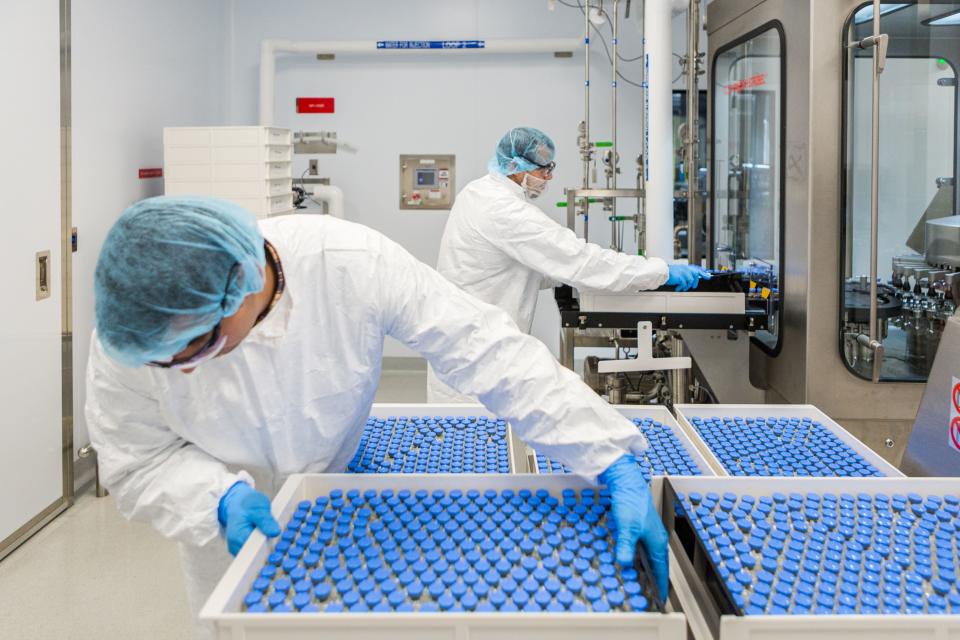Study shows remdesivir has promise as coronavirus treatment
With the U.S. death toll from the coronavirus outbreak topping 60,000 this week and confirmed cases of COVID-19 in America surpassing the 1 million mark, the country has seized on news that the antiviral drug remdesivir is a potential treatment for the disease.
Dr. Anthony Fauci, the leading expert on infectious diseases on the coronavirus task force, hailed the results of a clinical trial, under the auspices of the agency he heads, the National Institute of Allergy and Infectious Diseases. The double-blind study, involving more than 1,000 people, showed that a majority of patients treated with remdesivir took an average of 11 days to recover from COVID-19, compared with 15 days for those given a placebo.
“The data shows that remdesivir has a clear-cut, significant, positive effect in diminishing the time to recovery,” Fauci said in a Wednesday interview with NBC News, adding that remdesivir’s recent clinical trial “has proven that a drug can block the virus.”
History
Remdesivir was first developed in the laboratories of the American biopharmaceutical company Gilead Sciences in the hopes of treating viral infections. It was tested on a number of viruses, including SARS and MERS, prior to the outbreak of Ebola in western Africa in 2014. Gilead Sciences sought to have remdesivir approved as a treatment for Ebola, and began clinical trials to establish its effectiveness. The data from the largest trial, however, showed that, while remdesivir was considered safe for use, two other treatments yielded significantly better results against Ebola.
On Jan. 20 the first confirmed case of COVID-19 in the U.S. was reported in Everett, Wash. A 35-year-old man who had traveled to Wuhan, China, was admitted to Providence Regional Medical Center, and quickly developed breathing problems. The man’s doctors consulted the Centers for Disease Control and Prevention, who suggested that they try using remdesivir to treat him. The drug was given to the patient on his seventh day in the hospital, and he began feeling better the next day, STAT reported.

FDA approval
While the initial results from clinical trials have been encouraging, the Food and Drug Administration has not yet approved remdesivir to treat COVID-19.
“We’re working with the company to emphasize the necessity of speed while at the same time to understand the data,” FDA Commissioner Stephen Hahn said in a Thursday interview with Bloomberg. “There will be a lot of factors that go into all the regulatory decisions. We want to look at the totality of data to make sure that remdesivir is targeted to the right patients.”
Hahn said that, as early as this week, it was possible that the FDA would grant remdesivir emergency authorization status, meaning it could be prescribed to patients while research continues.
President Trump said Wednesday that he “would like to see very quick approvals, especially with things that work.” To date, however, the only drugs the FDA has approved for emergency authorization to treat COVID-19 have been hydroxychloroquine and chloroquine. While Trump encouraged doctors and patients to use those drugs to treat COVID-19, side effects including irregular heartbeat have discouraged many doctors from prescribing them.
No silver bullet
Although the full results of the National Institute of Allergy and Infectious Diseases (NIAID) trial on remdesivir have yet to be released, the methodology it employs is considered the gold standard. A double-blind, randomized placebo-controlled trial, it should provide the clearest evidence of whether remdesivir is truly effective in treating COVID-19. But as Fauci himself has pointed out, the initial results of the trial show that the drug can reduce the amount of time COVID-19 patients spend in the hospital. It does not, however, prevent death in all who have taken it. Eight percent of patients given remdesivir during the trial died from COVID-19, versus 11 percent of those who were given a placebo.
Gilead Sciences announced Wednesday that it had conducted a separate trial showing that a five-day treatment of remdesivir was as effective as a 10-day course of the medication, a finding that will boost supply of the drug. Currently, however, the company says it has only 50,000 treatment courses, STAT reported, and will seek to produce millions more by the end of the year. That may not be enough to avert a shortage if the NIAID trials confirm that remdesivir is an effective treatment for COVID-19.
Cover thumbnail photo: Gilead Sciences Inc. via Reuters
_____
Click here for the latest coronavirus news and updates. According to experts, people over 60 and those who are immunocompromised continue to be the most at risk. If you have questions, please refer to the CDC’s and WHO’s resource guides.
Read more:



